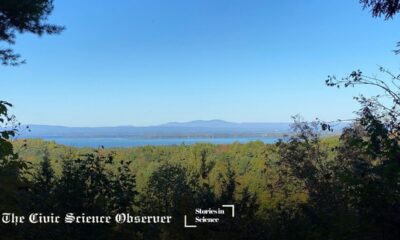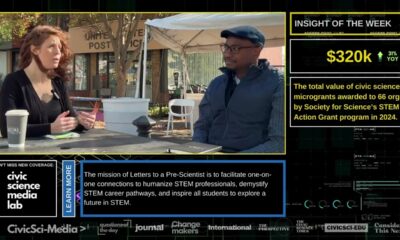Stories in Science Special Series
A Ride of a Lifetime

by John Kropowensky | Curriculum Coordinator at Harvard University |
[dropcap]T[/dropcap]he relationship I have had with science has been one of many ups and downs, a roller coaster ride speeding up, stopping suddenly, and revealing the beautiful world at its peak. Science is not so different from this thrill ride. When one learns about science the world can feel infinite and weightless, but also overwhelming and daunting, forever changing in our minds, and molding our perceptions of what humans can achieve. Let me take you on my ride with science thus far.
When I was a child, I remember enjoying science immensely. I would experiment and play in my backyard, finding bugs and creating “rivers” with the hose. Of course, my mother did not appreciate the mud piles that these experiments created, but that did not quell my fascination about the world around me. In school, science was fun. I remember learning about whales, the planets (a category which Pluto will always remain in for me), and my all-time favorite, dinosaurs! There was so much to discover, and so many ways to understand and grow. But as I aged, and continued my education in middle school, high school and beyond, that diversity of viewpoints and ways to explore decreased, and my peers and I were steadily constricted into a more narrow view, a line that became longer and more tedious, all the while the excitement and freedom that science provided slowly slipped away.
This change was partially due to the tracking of my middle and high school. Students that were not seen as “high achievers” were placed in what was affectionally called “the dumb class.” In reality these science classes were college prep courses, but the culture of my town had designated anything that was not advanced as 
I am a believer that any person can achieve success when they are given the right support and the needed information.
I went through college in a similar fashion. I got through any course that was required, but never wondered about what other classes were available to me. I had enough requirements for my major and minor; science had completely fallen by the wayside, and after a high school culture told me that I was not good enough at science, I started to believe it. Perhaps science was not a strength I had. Every now and then my curiosity would peak. After college, I worked in a chemistry lab as a manual laborer, cleaning out the attic. It was not the most glamorous job, but my arms sure looked good by the end of the summer! As I worked I would see the scientists in their lab coats, beakers and flasks in hand. I was always fascinated by what could be in the beakers. The scientists, at least in that building, were mostly quiet. None had interacted with me before, but one day I asked a woman what was in her flask. She looked at me, somewhat annoyed (for some unknown reason) and said “You really would not understand.” She then turned away from me, and we continued down the elevator silently. I understood I may have looked quite disheveled in my gear that day, but what a rude comment to say, thinking I would be too blue collar, too thick headed, too unlike her to understand. I continued to work in academia for many years. I had moved up from my operations job and worked in an academic office, but the sting of the pretentiousness and patronization from the scientists in those buildings stayed with me.
Eventually the culture of higher education had become too mundane for me as well, paralleling what had happened to my relationship in science. I knew I had to return to my passion of teaching. I had worked with children throughout high school, college, and post-college before settling into higher education. Teaching brought a joy to my life, an excitement that I had not had in quite some time. Teaching others and seeing others be excited about learning was enveloping. It made each day better, knowing you were truly helping. And so I went onto graduate school, which eventually cumulated into a practicum, where I worked in a fifth grade classroom. It was during this time that I regained my interest in science. At first, teaching the science lessons was anxiety inducing. After all, I had myself convinced that I was not very good at the subject. But as the lessons continued, I saw how interested the children were becoming. I knew that I needed to break the trend that I had experienced, and allow my children to learn as best they could. I never wanted to limit a student in science because of any factor. I am a believer that any person can achieve success when they are given the right support and the needed information. So for my elementary students, that meant teaching in a variety of ways; with music, with games, with observations, all along with more traditional modalities. I knew that some students would catch on quickly with the traditional teaching methods and viewpoints, but I also knew that there were some students who would understand just as well, or better, if they saw, absorbed, and showed the information in a different way. Unlike my education, where there was only one way to teach and learn science, I provided several, and this way of teaching made me more knowledgeable about the content as well. I wanted to learn more so my students could learn more. I never wanted and never want to assume that any child cannot understand. That child may be the young man in the elevator feeling ostracized, just needing a different viewpoint, or just somebody to believe in them.
We need to promote science, showing its value, but also showing that anybody can get into it, whether you are a man, woman, black, white, gay, straight, etc.
We need to change the way society looks at science and scientists. We are given conflicting views: science is important yet it is not a priority in schooling, scientists are very smart yet we accept and expect them to be socially inept. We need to promote science, showing its value, but also showing that anybody can get into it, whether you are a man, woman, black, white, gay, straight, etc. If we perpetuate the viewpoint that scientists are all quiet introverts, then we are ignoring the silly extroverted people who may just be the next great scientist, hidden behind different character traits. We all benefit from science, and we will also benefit from sharing science with each other. That is what I have learned from my students, and that is what I continue to take with me moving forward.
Featured Image titled “Victorian Horse Ride” is by Natesh Ramasamy from Flickr | Some rights reserved
The CS Media Lab is a Boston-anchored civic science news collective with local, national and global coverage on TV, digital print, and radio through CivicSciTV, CivicSciTimes, and CivicSciRadio. Programs include Questions of the Day, Changemakers, QuickTake, Consider This Next, Stories in Science, Sai Resident Collective and more.

-
Audio Studio1 month ago
“Reading it opened up a whole new world.” Kim Steele on building her company ‘Documentaries Don’t Work’
-
 Civic Science Observer1 week ago
Civic Science Observer1 week ago‘Science policy’ Google searches spiked in 2025. What does that mean?
-
Civic Science Observer1 month ago
Our developing civic science photojournalism experiment: Photos from 2025
-
Civic Science Observer1 month ago
Together again: Day 1 of the 2025 ASTC conference in black and white
Contact
Menu
Designed with WordPress
























